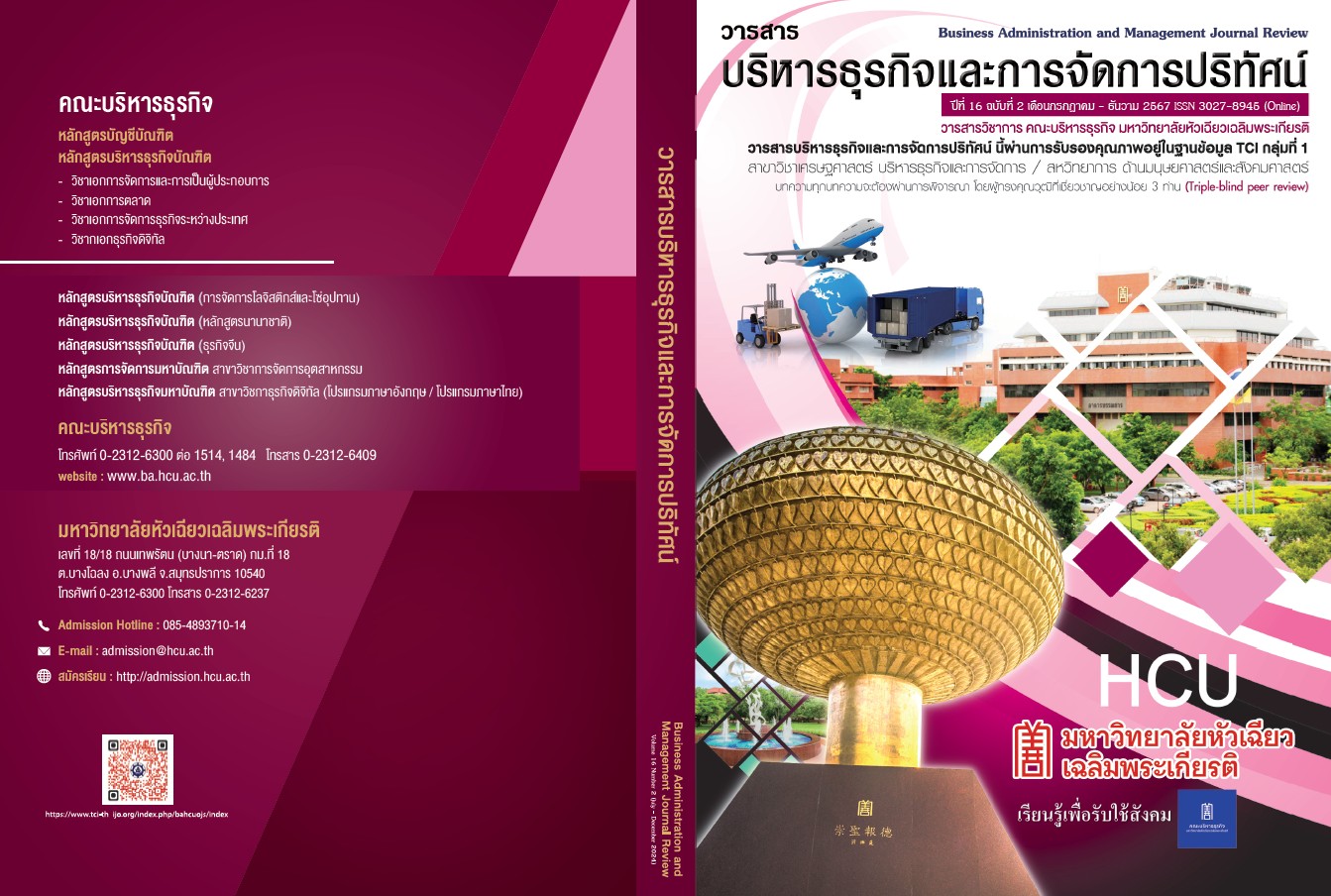The Influence of Green Logistics towards the Business Performance under Circular Economy Principles: The Case of the Packaged Food Industry in Thailand
Keywords:
Green logistics, Circular economy, Business performance, Packaged food industryAbstract
This study examined the factors influencing the firm performance under circular economy principle using Thailand packaged food industry context. We hypothesized that the firm performance under circular economy optimizes when process alignment exists in green logistics, customer integration, and production efficiency. We distributed the questionnaire survey to 400 entrepreneurs of packaged food enterprise in Thailand and analyzed the data via Partial Least Square Structural Equation Modeling (PLS-SEM) using SmartPLS 4.0 program. Reflective-formative model was employed and the reliability test, validity test, and hypothesis testing were conducted. The results confirmed that green logistics positively influence firm performance under circular economy principle directly and indirectly via the mediating roles of customer integration and production efficiency. The findings imply that customer integration and production efficiency play important roles in enhancing the operational success and firm stability. Our empirical results provide guidelines for entrepreneurs in strategic green supply chain management such as logistics efficiency, waste reduction, pollution prevention, green innovation access, all of which enable advancement in Thailand packaged food industry towards becoming a sustainable manufacturing base for the global markets.
References
Bag, S., Wood, L. C., Mangla, S. K., & Luthra, S. (2020). Procurement 4.0 and its implications on business process performance in a circular economy. Resources, Conservation and Recycling. 152: 104-502.
Chin, W. W. (1998). The partial least squares approach to structural equation modeling. Modern methods for business research. 295(2): 295-336.
De Souza, E. D., Kerber, J. C., Bouzon, M., & Rodriguez, C. M. T., (2022). Performance evaluation of green logistics: Paving the way towards circular economy. Cleaner Logistics and Supply Chain. 3(1): 100019.
Del Giudice, M., Chierici, R., Mazzucchelli, A., & Fiano, F. (2020). Supply chain management in the era of circular economy: the moderating effect of big data. The International Journal of Logistics Management. 5(2): 145-176.
Fornell, C., & Larcker, D. F. (1981). Evaluating structural equation models with unobservable variables and measurement error. Journal of Marketing Research. 18(1): 39-50.
Jinru, L., Changbiao, Z., Ahmad, B., Irfan, M., & Nazir, R. (2022). How do green financing and green logistics affect the circular economy in the pandemic situation: key mediating role of sustainable production. Economic Research-Ekonomska Istrazivanja. 35(1): 3836-3856.
Kamalanon, P., Chen, J. S., & Le, T. T. Y. (2022). “Why Do We Buy Green Products?” An Extended Theory of the Planned Behavior Model for Green Product Purchase Behavior. Sustainability. 14(2): 689.
Karaman, A. S., Kilic, M., & Uyar, A. (2020). Green logistics performance and sustainability reporting practices of the logistics sector: The moderating effect of corporate governance. Journal of Cleaner Production. 258: 120-718.
Kendall, H., Kaptan, G., Stewart, G., Grainger, M., Kuznesof, S., Naughton, P., ... & Frewer, L. J. (2018). Drivers of existing and emerging food safety risks: Expert opinion regarding multiple impacts. Food Control. 90(1): 440-458.
Likert, R. E. N. S. I. S. (1972). Likert technique for attitude measurement. Social psychology: Experimentation, theory, research. Scranton, PA: Intext Educational Publishers.
Lingyu, M., Lauren, C., & Zhijie, D. (2019). Strategic development of fresh e-commerce with respect to new retail. In 2019 IEEE 16th International Conference on Networking, Sensing and Control (ICNSC). 373-378.
Rizvi, S. K. A., Mirza, N., Naqvi, B., & Rahat, B. (2020). Covid-19 and asset management in EU: A preliminary assessment of performance and investment styles. Journal of Asset Management. 21(4): 281-291.
Ringle, C. M., Wende, S., & Becker, J. M. (2022). SmartPLS 4. Oststeinbek: SmartPLS GmbH.
Seroka-Stolka, O., & Ociepa-Kubicka, A. (2019). Green logistics and circular economy. Transportation Research Procedia. 39(1): 471-479.
Shahzad, M., Qu, Y., Javed, S. A., Zafar, A. U., & Rehman, S. U. (2020). Relation of environment sustainability to CSR and green innovation: A case of Pakistani manufacturing industry. Journal of Cleaner Production. 253: 119-938.
Susanty, A., Tjahjono, B., & Sulistyani, R. E. (2020). An investigation into circular economy practices in the traditional wooden furniture industry. Production Planning & Control. 31(16): 1336-1348.
Takacs, F., Brunner, D., & Frankenberger, K. (2022). Barriers to a circular economy in small-and medium-sized enterprises and their integration in a sustainable strategic management framework. Journal of Cleaner Production. 31(2): 132-227.
Torasa, C., & Mekhum, W. (2020). Impact of green logistics activities on circular economy: panel data evidence from ASEAN. International Journal Of Supply Chain Management. 9(1): 239-245.
Trivellas, P., Malindretos, G., & Reklitis, P. (2020). Implications of green logistics management on sustainable business and supply chain performance: evidence from a survey in the greek agri-food sector. Sustainability. 12(24): 10515.
Umar, M., Ji, X., Mirza, N., & Naqvi, B. (2021). Carbon neutrality, bank lending, and credit risk: Evidence from the Eurozone. Journal of Environmental Management. 296: 113-156.
Wang, K., Huo, B., & Tian, M. (2021). How to protect specific investments from opportunism: A moderated mediation model of customer integration and transformational leadership. International Journal of Production Economics. 232: 107938.
Wong, C. Y., Wong, C. W., & Boon-itt, S. (2020). Effects of green supply chain integration and green innovation on environmental and cost performance. International Journal of Production Research. 58(15): 4589-4609.
Yang, Q., Geng, R., Jiang, Y., & Feng, T. (2021). Governance mechanisms and green customer integration in China: The joint effect of power and environmental uncertainty. Transportation Research Part E: Logistics and Transportation Review. 149: 102-307.
Zhang, W., Zhang, M., Zhang, W., Zhou, Q., & Zhang, X. (2020). What influences the effectiveness of green logistics policies? A grounded theory analysis. Science of the Total Environment. 714: 136-731.
Zhu, J., Fan, C., Shi, H., & Shi, L. (2019). Efforts for a circular economy in China: A comprehensive review of policies. Journal of Industrial Ecology. 23(1): 110-118.
Downloads
Published
How to Cite
Issue
Section
License
Copyright (c) 2024 Business Administration and Management Journal Review

This work is licensed under a Creative Commons Attribution-NonCommercial-NoDerivatives 4.0 International License.
All articles published in the Business Administration and Management Journal Review are copyrighted by the journal.
The views and opinions expressed in each article are solely those of the individual authors and do not represent those of Huachiew Chalermprakiet University or any other faculty members. Each author is fully responsible for the content of their own article. Any errors or issues found are the sole responsibility of the respective author.




